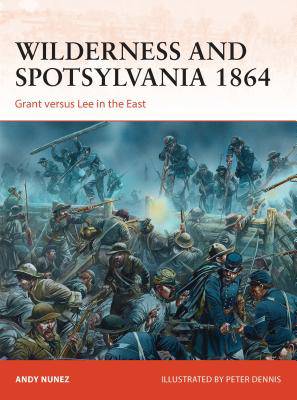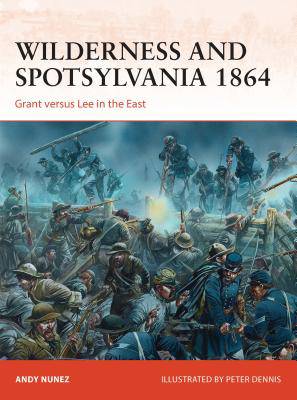
- Retrait gratuit dans votre magasin Club
- 7.000.000 titres dans notre catalogue
- Payer en toute sécurité
- Toujours un magasin près de chez vous
- Retrait gratuit dans votre magasin Club
- 7.000.0000 titres dans notre catalogue
- Payer en toute sécurité
- Toujours un magasin près de chez vous
Description
Grant and Lee fought near Chancellorsville, VA in a confusing series of battles amidst brush thickets and wildfires. Unlike previous campaigns, Grant simply kept flanking Lee, trying frontal assaults at Spotslvania's 'mule-shoe' and Cold Harbor along the way to laying seige to Richmond and Petersburg.
In May 1864 the Union Army of the Potomac under General George Meade had been in a leisurely pursuit of the Confederate Army of Northern Virginia for nearly a year after the defeat of the Rebels at Gettysburg. Confederate commander General Robert E. Lee still retained his awe-inspiring reputation for wrecking Union armies that got too close to Richmond and Meade was still cautious. His tactics at Gettysburg were defensive and he was unsure that he was able to take the offensive against Lee. However, things changed when President Abraham Lincoln appointed General Ulysses S. Grant to command all Union armies. Grant came east and laid out a comprehensive strategy for the rest of the war. In the deep South, General William T. Sherman would march out of Tennessee to cut the Confederacy in half by taking Atlanta. Grant would lead the Army of the Potomac across the Rapidan River and march on Richmond. He had the manpower and equipment to accomplish his objective, easily outnumbering Lee. Lee, on the other hand, was far from beaten and saw Grant as just another Union general to be sent packing, much as he had sent McClellan, Burnside, Pope and Hooker away two years before. As Grant's army slowly entered the tangle of woods beyond Fredericksburg known as the Wilderness, Lee planned to pin him there and destroy him as he struggled to emerge. The stage was set for the campaign that would forever dictate the terms of the Civil War in the East.Spécifications
Parties prenantes
- Auteur(s) :
- Editeur:
Contenu
- Nombre de pages :
- 96
- Langue:
- Anglais
- Collection :
- Tome:
- n° 267
Caractéristiques
- EAN:
- 9781472801470
- Date de parution :
- 20-05-14
- Format:
- Livre broché
- Format numérique:
- Trade paperback (VS)
- Dimensions :
- 183 mm x 246 mm
- Poids :
- 317 g

Les avis
Nous publions uniquement les avis qui respectent les conditions requises. Consultez nos conditions pour les avis.






